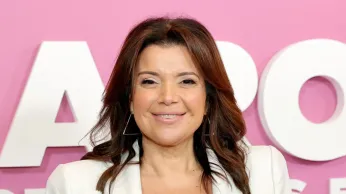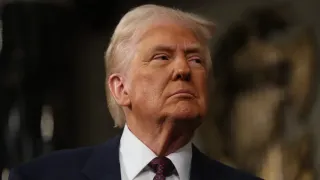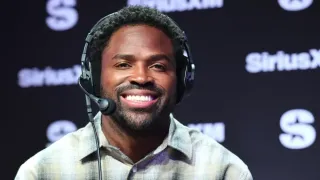
4 hours ago
Ana Navarro Urges Gloria Gaynor to Reject Trump’s Kennedy Center Honor
READ TIME: 3 MIN.
Former President Donald Trump’s recent announcement regarding his takeover of the Kennedy Center board of trustees and his self-appointment as chairman have stirred significant controversy in Washington, D.C. Traditionally a nonpartisan celebration of American cultural contributors, the Kennedy Center Honors have now become the latest battleground for political and cultural tensions. Trump cited his motivation for leadership as a response to the center allegedly hosting “Drag Shows specifically targeting our youth,” positioning his stewardship as a corrective to what he characterized as a “woke” agenda. He then revealed his personal selection of honorees, claiming to have chosen “98 percent” of the recipients and to have rejected several candidates he labeled as “woke”.
Among Trump’s picks are country singer George Strait, Phantom of the Opera star Michael Crawford, actor Sylvester Stallone, rock band KISS, and disco icon Gloria Gaynor, whose signature hit “I Will Survive” is widely regarded as a gay anthem and symbol of resilience within the LGBTQ+ community.
Ana Navarro, cohost of The View and a prominent political commentator, responded directly to Trump’s announcement by urging Gloria Gaynor to reconsider accepting the honor. Navarro’s call came via a heartfelt Instagram post, in which she recounted meeting Gaynor at a Miami concert. During their encounter, Gaynor gifted Navarro a keychain that played “I Will Survive,” an anthem that Navarro described as a source of comfort and hope during Trump’s first term in office. “Let’s just say, during first Trump term, I pressed it until it ran out of batteries,” Navarro wrote, highlighting the song’s personal and broader cultural significance for those resisting anti-LGBTQ+ policies.
Navarro’s appeal to Gaynor was explicit: she asked the singer to “think of the gay community,” framing the decision as not only personal, but deeply symbolic for LGBTQ+ audiences who have long viewed “I Will Survive” as a rallying cry for survival, dignity, and pride. Navarro’s intervention reflects a larger concern among LGBTQ+ advocates about the implications of accepting honors under Trump’s leadership, especially in light of his history of opposing LGBTQ+ rights and using culture war rhetoric.
Gloria Gaynor’s music, particularly “I Will Survive,” has been a mainstay at Pride events, queer celebrations, and moments of protest since its release in 1978. The song’s enduring power lies in its message of perseverance and self-affirmation, themes that resonate deeply with transgender people, queer people of color, and all members of the LGBTQ+ community facing adversity. For many, Gaynor’s potential acceptance of an honor orchestrated by Trump would be seen as a painful contradiction, given the former president’s record on LGBTQ+ issues and his efforts to roll back protections for queer and transgender people during his administration.
Advocates and cultural commentators emphasize that awards and honors carry significant symbolic weight. For marginalized communities, public recognition and celebration of their icons can affirm their history and struggles; conversely, association with political figures known for anti-LGBTQ+ stances can feel like a betrayal of those very values. The controversy surrounding Gaynor’s nomination is emblematic of broader questions about the intersection of art, politics, and social justice.
Navarro’s public plea has sparked widespread conversation across social media, with many LGBTQ+ activists and allies echoing her concerns. Some argue that Gaynor’s legacy should not be co-opted for political gain, especially by individuals or institutions that have historically opposed queer visibility and rights. Others contend that refusing the honor would send a powerful message of solidarity and resistance, reaffirming the importance of standing with the LGBTQ+ community in moments of political tension.
As of this writing, Gloria Gaynor has not issued a public response to Navarro’s request or Trump’s announcement. The situation continues to generate debate within queer media and cultural circles, reflecting the ongoing challenges faced by LGBTQ+ icons in navigating the complex terrain of recognition, representation, and resistance.
For LGBTQ+ readers and viewers, the story remains a vivid reminder of how cultural symbols and public figures can become focal points in broader struggles for dignity, inclusion, and justice.






